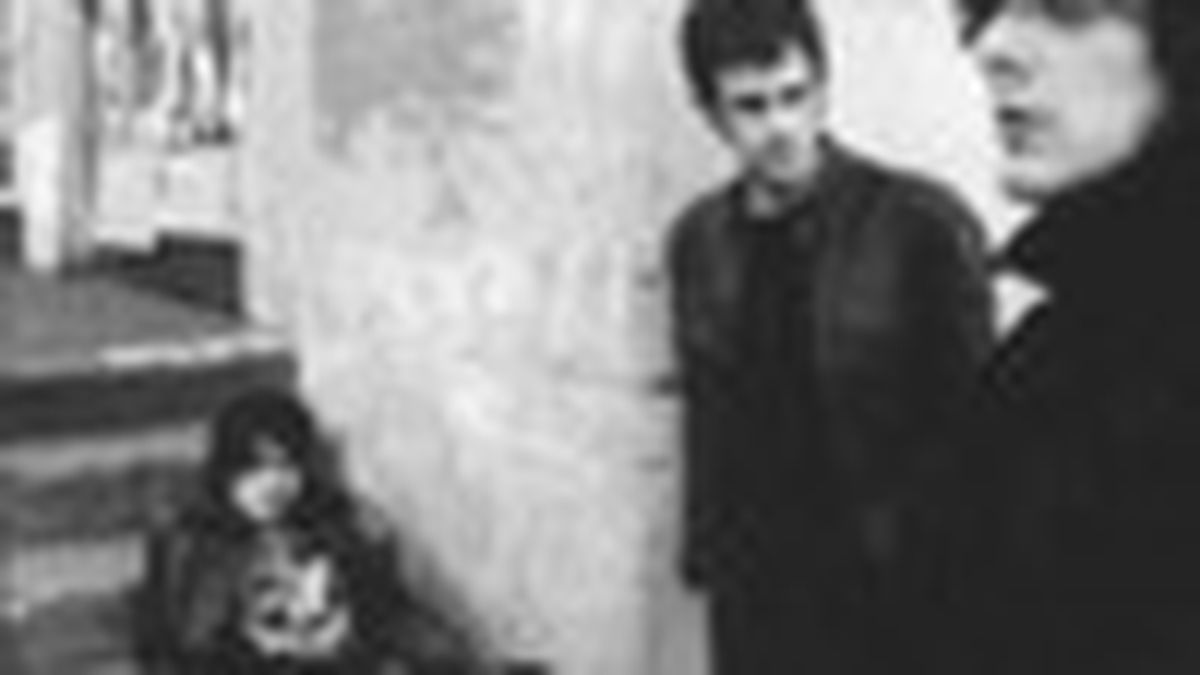BLACK REBEL MOTORCYCLE CLUB
Black Rebel Motorcycle Club Virgin
Narcotic Brit-rock was the drug of choice in the mid-’80s/early ’90s. Bands like the Jesus and Mary Chain, Ride, and My Bloody Valentine left trails of feedback with every chord they struck in their lush rock arrangements. A decade later, Black Rebel Motorcycle Club–a one-time San Francisco band–is carrying the psychedelic torch. Its self-titled debut induces flashbacks of ’60s psych, ’70s Motor City rumblings, and ’90s noise rock. BRMC’s slow burning, Jim Reid-on-downers vocals cover heartache, rock ‘n’ roll, and Jesus Christ over thick blankets of guitar distortion in true J&MC fashion. Oceanic, Slowdive-like melodies and bottom-heavy MC5 riffs pepper the mix between rambling Spiritualized jams. In this shoegazing resurrection, BRMC definitely wears its influences on its black leather sleeves. For fans of any of the bands excavated on the album, though, Black Rebel Motorcycle Club is a diamond debut that shines on its own.–Jennifer Maerz
MICHAEL NICOLELLA
Push Gale
From the first driving notes of Roberto Sierra’s “Toccata y Lamento,” Seattle-based classical guitarist Michael Nicolella impresses with his virtuosic musicianship. Equally impressive is Nicolella’s immensely challenging modern program for acoustic and electric guitar, which includes Piazzolla’s captivating “Primavera Portena,” Takemitsu’s “Equinox,” Jimi Hendrix’s “Little Wing,” and two of Nicolella’s own compositions. Nicolella’s “Bridges” for flute, violin, guitar, and percussion is an especially wild and beautiful ride. Another highlight is Berio’s chamber arrangement of the traditional “Black Is the Color of My True Love’s Hair,” the melody beautifully sung by East Bay expatriate soprano Thomasa Eckert, her voice triumphing over overresonant acoustics to perfectly capture the innocence and purity of the verse. When I played John Fitz Rogers’ mile-a-minute, machine-gun-like “Push” (written for Nicolella) for eight-year-old Morgan Saltz of Montclair, she smilingly confided that it made her feel “excitement… like turning somersaults in my stomach.” After playing Berio’s challenging “Sequenza XI”–whose uncompromising atonal outbursts, punctuated by hard raps on the guitar’s body, might make neighbors bang on the door, shouting, “Turn down that infernal racket”–I told Morgan that some might not consider it music. “Why?” she asked, puzzled. “It has rhythm, it has melody–why would anyone say it’s not music?” I highly recommend this disc to all with open minds and a taste for adventure.–Jason Serinus
GEORGE MRAZ
Morava Milestone
Even in a field filled with the sensitive force of Dave Holland and the probing free-to-funky wisdom of Cecil McBee, nobody has the intonation and intensity of bassist George Mraz. On his new album, Mraz and drummer Billy Hart bring their finesse to twelve recompositions of Moravian folk tunes provided by pianist Emil Viklick´y and vocalist Zuzana Lapcíková. The latter also plays cymbalom (dulcimer), and when she does so alongside the piano, a wonderful chiming results that is only one of this recording’s unique pleasures. Another is her singing, as she renders these sensuous melodies with just a touch of Astrud Gilberto. But don’t think diva here. That overused term is not applicable to the clearly folkloric joy in her delivery; Lapcíková is too straightforward for that. Yet this music remains foreign, “mysterious” even, while opening its heart to the listener. The beauty of such remarkable jazz is born of its already heightened sense of space being illumined by something outside–in this case, the lives, loves, and dances of people centuries ago–that is undeniably inside, the way a photograph’s background, say in a silhouette against a train window, can pull all the light from the subject, and offer its own story, its own tastes and temptations.–J.D. Buhl
DAFT PUNK
Discovery Virgin America
With this new album, the French duo Daft Punk doesn’t really break new ground, excepting perhaps the clever “Daft Club” card that comes with the CD. The card is an inspired burst of promotion (or, if you prefer, marketing). After accessing the Web site and entering the card number, you’ll be sent all kinds of bitchen Daft Punk stuff via your computer–in theory, at least. Mine didn’t work. To be honest, Daft Punk has always reminded me of a brainier version of Disco Tex and the Sexolettes. On Discovery, their least cerebral effort to date, Thomas Bangalter and Guy-Manuel de Homem Christo have crossed the border from barren land of electronica into the more welcoming disco nation. The album bubbles over with synthesizers, voice decoders, and coy “ooh we’re so cute and ironic” Van Halen-ish guitar riffs. “One More Time” is a joyous, writhing example of electronica at its least pretentious. Guest vocals by Romanthony add to the songs’ mad sexiness. “Digital Love” features campy piano á la Captain and Tennille in a song for prom-going cyborgs; pseudo-metal guitar riffs and a catchy chorus complete this airy confection. Unfortunately, a few songs try for disco genius and fail. “Harder, Better, Faster, Stronger” induces troubling visions of sweaty exercisers pedaling wildly in spin class as an aerobics teacher yells in the background.–Michelle Turner












